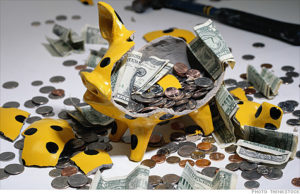 When it is time to decide what you would like to do with the extra money leftover after paying off all your bills. You can either save it or invest it. Although savings and investment are sometimes used interchangeably, many people confuse savings and investment for the concept – however, they are not the same. Both savings and investments can be used for meeting various expenses in life, there are some major differences between them.
When it is time to decide what you would like to do with the extra money leftover after paying off all your bills. You can either save it or invest it. Although savings and investment are sometimes used interchangeably, many people confuse savings and investment for the concept – however, they are not the same. Both savings and investments can be used for meeting various expenses in life, there are some major differences between them.
The primary difference between savings and investments is that while saving money generally implies putting aside a part of your income regularly in order to meet unforeseen expenses, investment means putting your saved money in various financial instruments in order to maximize your returns and grow your wealth.
Another key difference between savings and investment is the appetite for risk that you are willing to take when putting aside money for savings and investments. It might not make sense to park your savings in long term instruments with a lock in period that does not allow you to access them during a financial emergency – what savings were designed to do in the first place.
At the same time, keeping all your money stored in a safety vault might be very safe, but will not generate any returns over the years. On the other hand, if the money invested in various products like stocks, mutual funds, gold, etc. you may have to take on more risks, but there is potential for your investment to grow over time. If invested wisely, your money can grow over the years. If planned smartly, then investment in stock market can make your invested money grow manifold.
People typically save for meeting short term needs – a set target or objective. However, investment generally entails a longer horizon of six months or more. It is designed to provide returns and grow your money over a period of time.
Tags: budgeting, cash flow, economy, investments, loans, money, savings, stock market, stocks
 Budgeting, Financial Planning, Investment, Loan, Money, Savings
Budgeting, Financial Planning, Investment, Loan, Money, Savings
 An emergency is defined as any serious event that requires immediate attention. Bearing that in mind, what emergencies can occur that end up causing your finances serious harm? Below, you’ll find three big ones that can really hurt your family and your money:
An emergency is defined as any serious event that requires immediate attention. Bearing that in mind, what emergencies can occur that end up causing your finances serious harm? Below, you’ll find three big ones that can really hurt your family and your money:
Your House Getting Damaged
Damage to your house is an emergency none of us wants to deal with. The simple fact is there are many ways in which your house can suffer serious damages. What if a bad storm hits and the wind damages your roof or lightning strikes your house. Or, what if someone in your home accidentally starts a fire and your kitchen goes up in flames? When you start to think about it, there are so many things that can happen that lead to your house getting damaged. The worst thing is, in an emergency like this, the repairs to your house will be very costly. There could be serious damages that need fixing and a lot of work that needs to be carried out in your home. In some cases, you may need an entire roof replaced or your house cleared and dried out after water damages. Regardless of how your house gets damaged, the consequences may be very dire for your finances.
A Family Member Getting Arrested
When someone in your family gets arrested, it does count as an emergency. It’s come out of nowhere, it’s a challenging life event, and it requires immediate attention. We’re not talking about someone in your family getting arrested for serious crimes here. We’re talking about if someone is maybe out partying with their friends and they get arrested for drunk and disorderly behaviour. Or, they make a mistake and shoplift. Regardless, someone in your family might make an error of judgement and end up arrested and awaiting bail. This then means you have to go through the effort of contacting a company like Kat Bail Bonds to help you pay the bail and get them out of jail. Depending on the crime, it could cost a lot of money and leave your finances in a very bad position.
A Car Crash
Car crashes are probably the most common emergency out of all three listed here. Also, they’re very damaging to your finances as they can hurt you in multiple ways. With a car crash, you have the financial pain of dealing with a damaged car as well as any medical problems that may occur. You could end up with broken bones or muscle strains that require immediate and expensive medical attention. If you have a good insurance policy, you might be covered for events like this and not have to pay for repairs to your vehicle. Likewise, you could find a lawyer to help you make a personal injury claim and avoid those medical expenses. However, then you end up with a lawyer fee, which can also be costly! No matter where you turn, a car crash can have a detrimental effect on your finances for some time after the event.
If any of these emergencies happen, they need to be dealt with quickly. The problem is, they all require a lot of money to be spent. The best way to handle an emergency is to have an emergency fund set up. This means you’ve got money saved away to help you in case scenarios like these happen.
Tags: budgeting, cash flow, financial assistance, funding, insurance, investments, money, personal finance, savings
 Budgeting, Financial Planning, Insurance, Investment, Loan, Money, Personal Finance
Budgeting, Financial Planning, Insurance, Investment, Loan, Money, Personal Finance
 When it is time to decide what you would like to do with the extra money leftover after paying off all your bills. You can either save it or invest it. Although savings and investment are sometimes used interchangeably, many people confuse savings and investment for the concept – however, they are not the same. Both savings and investments can be used for meeting various expenses in life, there are some major differences between them.
When it is time to decide what you would like to do with the extra money leftover after paying off all your bills. You can either save it or invest it. Although savings and investment are sometimes used interchangeably, many people confuse savings and investment for the concept – however, they are not the same. Both savings and investments can be used for meeting various expenses in life, there are some major differences between them.












